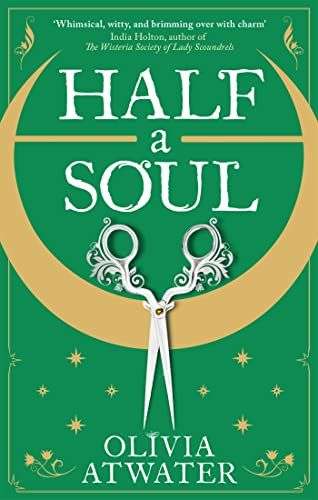We’ve implemented some new protocols around sending us messages via this website. Please email website “at” britishfantasysociety “dot” org for any issues.

For all things fantasy, horror, and speculative fiction
-
Announcement:

HALF A SOUL by Olivia Atwater from @orbitbooks
HALF A SOUL by Olivia Atwater
Orbit p/b £8.99
Reviewed by Nigel Robert Wilson

Since my earliest days as a reader – which is now close to seventy years – I have adored the Faerie tradition. The very idea that another sentient humanoid species could live close to humanity in a parallel universe under the nearest hollow hill remains a source of wonder. It subversively signals that things need not be the way they are.
Common tradition calls them the Good People, but they are not to be meddled with. Treat them with respect, and they will bestow their goodness on your garden and your family. Mistreat them, and it would be best that you had never been born. This needs to be taken as a coded sentiment as to how we should treat one another.
It was medieval theological scholars of the preaching sort who, from the thirteenth century onwards, insisted that the Faerie kind were treacherous children of Satan who must neither be trusted nor dallied with. This assertion derived directly from the persecution of heresy rather than anything else, but it created the concept of wicked faeries. This perspective worked better among the townsfolk than it did among rural people.
Olivia Atwater’s wonderful `Half a Soul’ begins with the wicked actions of a dark faerie, Lord Hollowvale, who manages to appropriate half the soul of the child, Dora. He is frustrated from taking her entirety by Dora’s cousin, Vanessa, who has the presence of mind to ram a pair of iron embroidery scissors into the ignoble lord’s leg. Sadly, this does not prevent Dora from growing up emotionally stunted with eyes of a different colour.
This is the time of the Regency, and it never ceases to amaze how this period entrances those of a romantic disposition. Indeed, its protagonists emphasise the wealth, the show and the formal social nature of this period whilst invariably ignoring that for most of the population of Britain, this period was the horrific interlude that persisted between the first industrial revolution of the factory system and the second industrial revolution of steam engines by way of agricultural depopulation associated with the enclosure of land to create the wealth the romantics so clearly adore!
Thankfully, after playing a few tedious games to set the scene, Atwater has the grace to embrace the reality of the workhouse and the grinding poverty that helped to push young men into the British army to feed recruits to fight the Peninsular War against the tyrant Napoleon, by then in full swing. At this point, the narrative takes off and blossoms.
Lord Elias Wilder, who bears the title Lord Sorcier, is an anonymous in-comer from Faerie. He is what was once called a changeling. His back story is difficult, but it comes later in the tale. He is pursuing a cure for a strange sleeping sickness that seems to afflict certain workhouse children. Wilder is the true hero of a story narrated through the discoloured eyes of Dora. Within their social ambience is the physician Albert Lowe, son of Viscount Carraway, who is deemed a suitable husband for either Vanessa or Dora. He is a great friend of the Lord Sorcier, having had a prosthetic arm provided by the magician following their adventures in the war.
The tale is a pleasing mixture of characters and circumstances written to delight and amuse. Atwater parodies the social forms and pretensions of the period as she inverts high society into Faerie society and back again. Suffice it to say Dora is finally able to pull herself together, everyone finds their true love, and they all live happily ever after. This is the real stuff of Faerie tales, isn’t it?
Great fun and good value.
Explore the blog:
Blog categories:
Latest Posts:
Tags:
#featured (56) #science fiction (25) Book Review (264) events (44) Fantasy (231) Graphic Novel (13) horror (136) Members (62) Orbit Books (48) profile (43) Romance (17) Science Fiction (50) short stories (28) Titan Books (52) TV Review (15)
All reviews
Latest Reviews:
- THE HOUSE ON THE BORDERLAND by William Hope Hodgson
- Monstrum by Lottie Mills
- Mood Swings by Dave Jeffery
- Yoke of Stars by R.B. Lemberg
- Hera by Jennifer Saint
- The Black Bird Oracle by Deborah Harkness
- RETURN OF THE DWARVES By Markus Heitz
- Delicious in Dungeon
- Toxxic by Jane Hennigan
- THIS ISLAND EARTH: 8 FEATURES FROM THE DRIVE-IN By Dale Bailey
Review tags:
#featured (2) Action (4) Adventure (4) Book Review (28) Fantasy (18) Featured (2) Feminist (2) Gothic Horror (3) Horror (14) Magic (3) Orbit Books (3) Romance (6) Science Fiction (5) Swords and Sorcery (2) Titan Books (7)